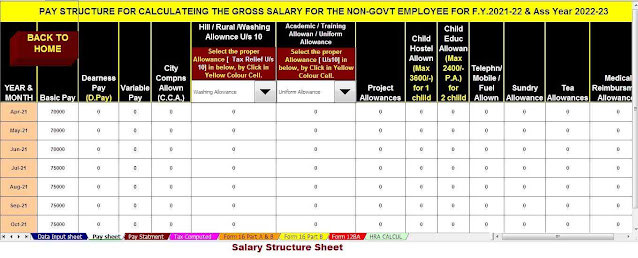Section 80TTA - deduction against interest earned on the deposit. With Auto-fill Income Tax Salary Arrears Relief Calculator U/s 89(1) with Form 10 E for the F.Y.2021-22
Section 80TTA of the Income-tax Act - deduction for interest earned. Section 80TTA of the Income Tax
Act provides a rebate for interest income. Discounts are available with some limitations and
restrictions. In this article, we have covered everything related to claiming tax exemption due to
interest earned
Tax exemption on interest income.
A Co-operative society that carries on the banking business.
The assessor can claim tax exemption when calculating his total income
Tax exemption on the interest income from time deposit is not available. A time deposit is a deposit that is payable with a fixed interest rate upon the expiry of a certain period of time. Therefore, the exemption cannot be given in the following cases:
Interest from fixed deposits
Interest from recurring deposits
No other time deposit
Amount of exemption under Section 80 TTA of the Income Tax Act
The maximum discount allowed under 8TTA is Rs 10,000 for one financial year.
If the total interest is less than Rs.10,000, the actual interest is discounted.
If the total interest is more than Rs 10,000, only Rs 10,000 is allowed as tax exemption
You may also, like- Automated Income Tax Preparation Excel Based Software All in One for the West Bengal Govt Employees for the F.Y.2021-22
The appraiser must consider its total interest from all savings bank accounts.
Eligibility to make claims under 80TTA
Cutting approved under 80TTA
The following taxpayers can claim deductions under Section 80TTA of the Income Tax Act:
Private Taxpayer or Hindu Undivided Family (HUF)
Indian residents
Non-Resident Indians (NRIs) who own NRO Savings Accounts
An entity with savings account in an organization such as a bank, post office or Co-operative society
80TTA discount
The following types of taxpayers are not eligible for this discount:
Interest income arises from any deposit in a savings account. The account is on behalf of or on behalf of:
A firm, or
An association of individuals, or
A body of individuals
Then no exemption will be given to any partner of the firm or any member of the association or any person of the organization. No discount can be given against the interest income of these taxpayers while calculating the total income.
Basically, a firm, AOP or BOI cannot claim interest discounts. And the partner or member receives its income from these firms, AOP or BOI. Therefore, they cannot claim a cut
You may also, like- Automated Income Tax Preparation Excel Based Software All in One for the Non-Govt(Private)Employees for the F.Y.2021-22
Moreover, even senior citizens cannot claim a waiver under the 80TTA. They can claim tax benefits within 80TTB.
You must first add interest income under the heading 'Income from other sources as interest income. You will then need to claim tax benefits under Section 80TTA under 80 Exemptions.
Income U/s 80TTB as per the Income Tax Act, 1961
Where a taxpayer's total income includes any income through interest on the deposit, that income is tax-free.
Ways to earn interest on deposits:
Banking sector &
A post office under the Indian Postal Office Act, 1898
The assessor can claim tax exemption when calculating his total income
The maximum allowable discount of 8TTB for a financial year is Rs.
If the total interest is less than Rs 50,000, the actual interest is discounted.
If the total interest is more than Rs 50,000, only Rs 50,000 is allowed as tax exemption
The difference between Section 80TTA and 80 TTB
Section 80TTA
Approved for individual taxpayers and Hindu Undivided Family (HUF)
Interest earned on deposits with savings account only
Section 80TTB
Approved only for citizens over 60 years of age
Interest earned: - Deposit with a savings account - Fixed Deposit, Term Deposit or Recurring Deposit
The exemption limit under section 80TTB is Rs. 50,000 per annum
Download Auto-Fill Income Tax Salary Arrears Relief Calculator U/s 89(1)with Form 10 E from the F.Y.2000-01 to F.Y.2021-22 (Updated Version)






No comments:
Post a Comment